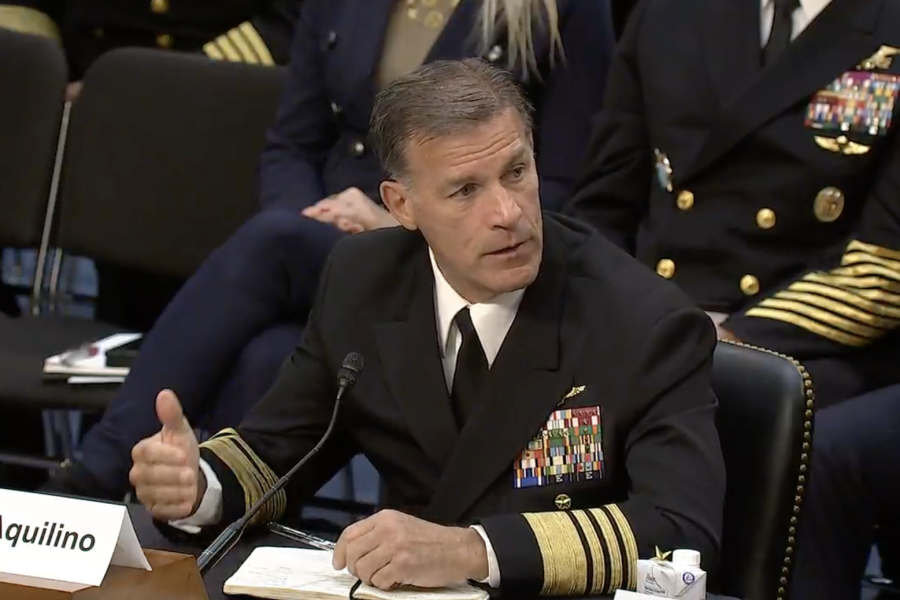After nearly three years with a front-row seat to China’s burgeoning military capabilities, the head of U.S. Indo-Pacific Command offered a parting warning to lawmakers on the country’s expanding geopolitical objectives.
“What we all have to understand is we haven’t faced a threat like this since World War II.” Navy Adm. John C. Aquilino told the Senate Armed Services Committee on March 21. “Their actions are becoming much more belligerent, their rhetoric is more clear. They have now articulated that the feature at Second Thomas Shoal is sovereign territory of the People’s Republic of China.”
The Second Thomas Shoal in the South China Sea has long been a subject of territorial dispute between China, the Philippines, and Taiwan.
In written testimony, Aquilino warned that Beijing continues its “aggressive military buildup, modernization, and coercive gray-zone operations,” all indications pointing to President Xi Jinping’s directive to be “ready to invade Taiwan by 2027.”
Aquilino’s appearances before Congress this week for a series of posture hearings will be his last as the top commander in the Indo-Pacific; Adm. Samuel Paparo was confirmed three weeks ago as the new INDOPACOM commander.
Earlier this month, China announced a 7.2 percent increase in its defense budget to 1.6 trillion yuan ($222 billion), continuing a steady annual uptick since 2020 and making the country the world’s second-largest defense spender after the U.S. Yet Aquilino echoed other analysts and experts who have suggested China’s actual defense spending is likely much higher.
“They’ve increased their defense budget 7.2 percent this year, that’s three years in a row they’ve increased it and I’m not sure that’s a very transparent number,” Aquilino said. “My assessment is they’re actually spending more on defense than they articulate.”
In its annual reports on Chinese military power, the Pentagon has noted that China now has the world’s largest Navy, boasting over 370 ships and submarines. And while experts have noted this assessment overlooks the fact that America’s naval tonnage surpasses China’s by a 2-to-1 ratio due to the larger size of U.S. vessels, Aquilino said his focus is on modernization and current production.
“The issue is what’s coming off the assembly line, and it’s significant,” Aquilino said. “Ten more ships, high-end warships alone this year, cruisers, destroyers. Full-rate production for J-20s, increased missile system satellite systems. To me, that’s the metric.”
The People’s Liberation Army Air Force is upgrading the Chengdu J-20, China’s response to the Lockheed Martin F-22 and the nation’s inaugural fifth-generation stealth fighters. In February, the Chinese military released a photo showcasing a fleet of at least six fighters in an elephant walk display.
Aquilino added that the PLA is “soon to be the world’s largest Air Force,” despite the Pentagon’s latest assessment reporting that the country possesses far less combat aircraft than the U.S. Air Force. INDOPACOM did not immediately respond to Air & Space Forces Magazine’s request to clarify whether Aquilino was using number of troops, aircraft, or budget for his comparison.
Also becoming more alarming is China’s actions in and over the South China Sea, highlighted earlier this month when the Phillippines accused the Chinese coast guard of using water cannons and obstructing a Philippine resupply mission in the region, dubbing it “the most serious incident yet.” Aquilino highlighted the country’s “bullying behavior” stretching from India to Malaysia and Vietnam, and emphasized that the U.S. would respond in line with the defense treaty agreement.
“The firehosing of our Philippine allies, the ramming of their ships and preventing their ability to resupply their sailors on the Sierra Madre, as well as restricting their ability to utilize the resources inside their Exclusive Economic Zone is all counter to international law,” Aquilino said. “We continue to articulate that Article Five of the mutual defense treaty applies if the Philippines, as our allies, were to be attacked.”
The U.S. continues to hold military exercises with the Philippines, including their biggest annual exercise ‘Balikatan.’ In November, the two nations conducted aerial exercise over the contested South China Sea region with U.S. F-15 Eagles and Philippines Air Force FA-50s.
More and more countries are responding the China’s aggressive behavior and looking to secure their interests in the region.
“We’re seeing it from U.K. and EU nations, more of them are going to deploy to the Pacific,” Aquilino said. “The centrality of [Association of Southeast Asian Nations] is important to the region, and it’s not that they’re not seeing it. It’s a concern about speaking out and being at risk for follow on PRC, economic coercion, and other behaviors that will negatively impact their nation.”
